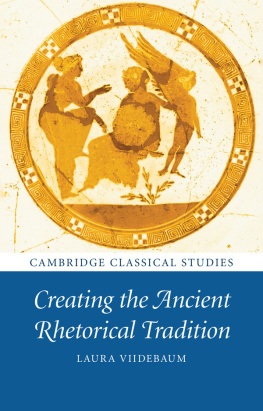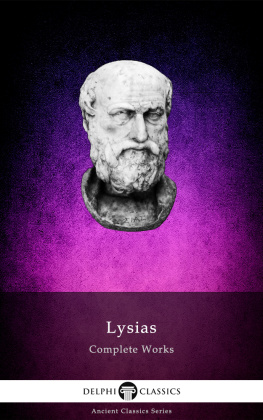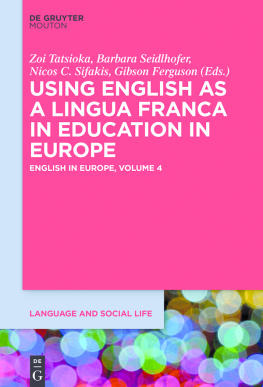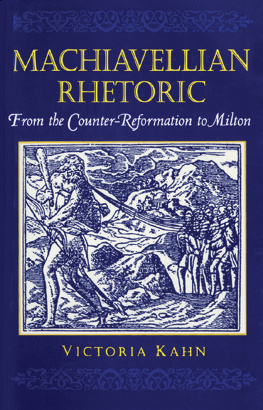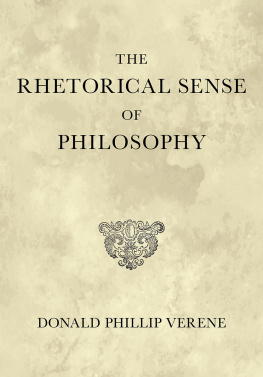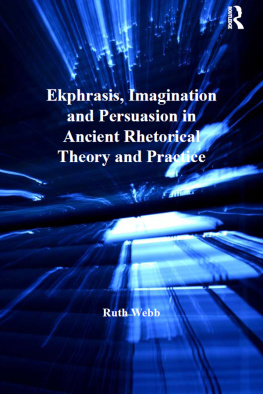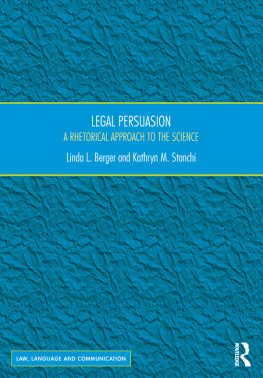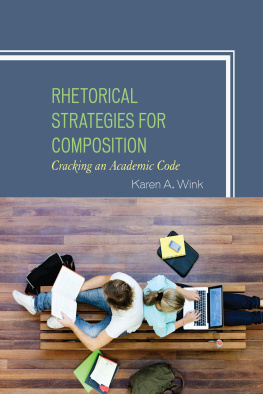This book explores the history of rhetorical thought and examines the gradual association of different aspects of rhetorical theory with two outstanding fourth-century bce writers: Lysias and Isocrates. It highlights the parallel development of the rhetorical tradition that became understood, on the one hand, as a domain of style and persuasive speech, associated with the figure of Lysias, and, on the other, as a kind of philosophical enterprise which makes significant demands on moral and political education in antiquity, epitomized in the work of Isocrates. There are two pivotal moments in which the two rhetoricians were pitted against each other as representatives of different modes of cultural discourse: Athens in the fourth century bce , as memorably portrayed in Platos Phaedrus , and Rome in the first century bce when Dionysius of Halicarnassus proposes to create from the united Lysianic and Isocratean rhetoric the foundation for the ancient rhetorical tradition.
Laura Viidebaum is an assistant professor in Classics at New York University. Her research focuses primarily on ancient rhetoric and ancient literary criticism, but she also has a long-standing interest in the way these fields relate to ongoing philosophical discussions. Recently, she has received a distinguished Humboldt fellowship to launch her new project on Aristotles Rhetoric .
University Printing House, Cambridge CB 2 8 BS , United Kingdom
One Liberty Plaza, 20th Floor, New York, NY 10006, USA
477 Williamstown Road, Port Melbourne, VIC 3207, Australia
314321, 3rd Floor, Plot 3, Splendor Forum, Jasola District Centre, New Delhi 110025, India
103 Penang Road, #0506/07, Visioncrest Commercial, Singapore 238467
Cambridge University Press is part of the University of Cambridge.
It furthers the Universitys mission by disseminating knowledge in the pursuit of education, learning, and research at the highest international levels of excellence.
www.cambridge.org
Information on this title: www.cambridge.org/9781108836562
DOI : 10.1017/9781108873956
Faculty of Classics, University of Cambridge 2021
This work is in copyright. It is subject to statutory exceptions and to the provisions of relevant licensing agreements; with the exception of the Creative Commons version the link for which is provided below, no reproduction of any part of this work may take place without the written permission of Cambridge University Press.
An online version of this work is published at doi.org/10.1017/9781108873956 under a Creative Commons Open Access license CC-BY-NC-ND 4.0 which permits re-use, distribution and reproduction in any medium for non-commercial purposes providing appropriate credit to the original work is given. You may not distribute derivative works without permission. To view a copy of this license, visit https://creativecommons.org/licenses/by-nc-nd/4.0
All versions of this work may contain content reproduced under license from third parties.
Permission to reproduce this third-party content must be obtained from these third-parties directly.
When citing this work, please include a reference to the DOI 10.1017/9781108873956
First published 2021
A catalogue record for this publication is available from the British Library.
ISBN 978-1-108-83656-2 Hardback
ISBN 978-1-108-81258-0 Paperback
Cambridge University Press has no responsibility for the persistence or accuracy of URLs for external or third-party internet websites referred to in this publication and does not guarantee that any content on such websites is, or will remain, accurate or appropriate.
A Mattia e alle nostre ragazze
Acknowledgements
I have always found speeches somewhat embarrassing. From family gatherings (with all those awkward toasts) to presidential addresses, speeches force a person into spotlight and such close scrutiny is weird, unusual, potentially embarrassing and hard to bear out with grace. For all the same reasons, they can be difficult to listen to. And of course, the harder the challenge the sweeter are the rewards that one can reap from a successful performance. Speeches can make or break careers, communities and countries. I have long been fascinated by our continuous love for speeches and by the fact that we are willing to put up with so many embarrassing exemplars to experience one that will capture the moment, express our collective feelings and give perspective and direction to our everyday lives. How does that work? This book presents my first sustained efforts at approaching the ever-complicated field of rhetoric and persuasion. It seemed best to start my search with fourth-century bce Athens, when ideas of rhetoric and its demarcation from philosophy and other discourse became topical in a way that may prove helpful to us, as we are constantly addressing and renegotiating these same dynamics. In fact, I am increasingly of the opinion that the still widely oral culture of the ancient world has many useful insights to offer us and our text-centered existence, especially as we are entering a new era of oral culture with its own technological advancements.
This book started life a number of years ago as a Cambridge dissertation under the generous supervision of Richard Hunter, whom I should like to thank first and foremost for not only being an ideal guide and extremely insightful critic throughout the graduate years, but for also offering an inspiring environment for my professional growth and for continuing his support to my projects and plans ever since. I have been truly privileged and am grateful to be able to acknowledge my deep debt to him. I have expressed my warmest thanks to friends and colleagues who were close to me and involved in the dissertation writing process elsewhere. Here, I would like to take the opportunity to mention the many supportive readers and interlocutors who have helped to turn the dissertation into a book and from whose insights the book has greatly benefited. The present work would not have been the same without the direct or indirect input by Emilia Barbiero, Alessandro Barchiesi, Joshua Billings, David Blank, Claire Bubb, Chris Carey, Joan Connelly, Joy Connolly, Raffaella Cribiore, Jyl Gentzler, Stephen Halliwell, Liz Irwin, Casper de Jonge, Larry Kim, Bryant Kirkland, David Konstan, Barbara Kowalzig, David Levene, Toomas Lott, Marko Malink, Daniela Manetti, Peter Meineck, Andy Monson, Helen Morales, Jessica Moss, Mike Peachin, Irene Peirano Garrison, Valeria Piano, James Porter, Lucia Prauscello, Nicholas Rynearson, Adele Scafuro, David Sider, Ellisif Wasmuth, Tim Whitmarsh, Chris Whitton, Nancy Worman, and Harvey Yunis. NYUs Department of Classics is a place I proudly call my academic home and I am grateful to all my colleagues and graduate students for offering me such warm welcome, for never ceasing to provide intellectual stimulation and for cheering me on in my professional and personal ventures. Here, I should like to single out in particular David Levene, who has been nothing short of simply amazing in his role as a faculty mentor. He has been a role model not only for being truly learned in the widest sense of our increasingly professionalizing discipline, but also for being savvy about the inside workings of academic institutions and academia as a way of life. I also want to express deep gratitude to friends and first teachers who oversaw my initial steps in academia and have fundamentally shaped my perception of academia, Classics, and life: Juhan Aru, Riin Kiv, Marju Lepaje, Anne Lill, Maria-Kristiina Lotman, Janika Pll, Uku Tooming, and Ivo Volt. Aith!

